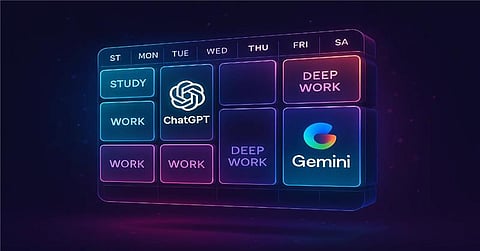

ChatGPT and Gemini ChatBot are no longer just buzzwords in the Artificial Intelligence world. They’ve become essential Software tools for US students trying to balance classes, part-time work, and deep-study sessions. Claude adds a human tone through its Language Model, while Perplexity and DeepSeek help with research. But when it comes to turning scattered notes and deadlines into an actionable weekly calendar, ChatGPT and Gemini stand out. In under 10 minutes, they create structure that students actually follow.
Jasmine, a sophomore in Boston, started her fall semester with good intentions. But within two weeks she was already behind.
Five courses with overlapping deadlines.
Three work shifts at the campus café.
A group project with no clear plan.
Her Notion Template was a graveyard of to-dos. She was reacting, not planning.
Then she tried ChatGPT:
Context: I am a college student with 5 courses, part-time work, and projects.
Task: Build a 7-day weekly plan.
Rules:
- Limit to 5 tasks/day.
- Include classes, work shifts, deep-work sessions.
- Keep Sunday evening free.
Output: Table (Day, Morning, Afternoon, Evening, Notes).
ChatGPT produced a draft in seconds. Claude polished the phrasing so tasks didn’t feel robotic. Gemini validated dates with her syllabus and flagged one overlapping deadline.
For the first time, Jasmine felt she could actually breathe.
The plan didn’t just include assignments. It built deep-work blocks around her hardest subjects, added rest evenings, and even marked out time for part-time shifts.
Before, Jasmine wrote random lists that felt like punishment. Now she had:
Morning blocks for high-focus study.
Afternoon slots for classes or shifts.
Evenings for lighter tasks or group meetings.
Sunday review to reset for the week ahead.
Claude reframed “complete econ reading” into “read 10 pages + take 3 bullet notes.” Gemini confirmed exam prep started two weeks earlier instead of the usual panic cram.
Marcus, a junior in Chicago, had a similar problem. His class schedule collided with two part-time jobs. He asked Gemini:
Context: I have 4 classes, 2 jobs, and a weekly volunteer shift.
Task: Validate my weekly schedule for conflicts.
Output: List of conflicts + suggested adjustments.
Gemini flagged two classes that overlapped with his work hours. ChatGPT rebuilt the schedule around fixed shifts. Claude rewrote tasks so the plan read like something he wanted to follow, not dread. Marcus avoided missing both work and classes in the same week.
Ana, a grad student writing her thesis, used ChatGPT for a different reason.
Context: I’m writing a thesis, teaching 2 classes, and taking 3 seminars.
Task: Create a 7-day plan with deep-writing blocks.
Constraints:
- 2-hour writing sessions 4 times/week.
- Prep time for teaching.
- One evening off.
ChatGPT structured the week, Claude rewrote into motivating instructions, Gemini validated deadlines against her research calendar. Instead of drowning in reading, Ana chipped away at her thesis daily.
By week four, Jasmine realized she was juggling too many tabs: ChatGPT for generation, Claude for tone, Gemini for validation. Copy-paste wasted precious time.
That’s when she switched to Chatronix.
Inside one workspace, she had:
6 models in one chat: ChatGPT, Claude, Gemini, Grok, Perplexity AI, DeepSeek.
10 free queries to test her planning system.
Turbo mode with One Perfect Answer — merging six model outputs into one clear schedule.
Side-by-side comparisons to pick the strongest plan instantly.
And since August, there’s been a bonus:
The Back2School campaign dropped the first month Pro to $12.5 instead of $25. For most students, cheaper than a single paper planner.
The hidden gem? The Prompt Library. Beyond chat, Chatronix includes tested prompts across education, business, copywriting, marketing, SMM. Instead of inventing inputs, students grab proven ones — like “weekly plan with classes and shifts” — and adapt in seconds. Users say it’s the single biggest time-saver.
Here’s the exact workflow Jasmine now runs every Sunday:
Context: I am a student with 5 courses, part-time shifts, and 2 projects.
Task: Build a 7-day weekly plan with morning/afternoon/evening blocks.
Rules:
- Max 5 tasks/day.
- Include deep-work sessions and review blocks.
- Keep Sunday evening off.
Claude: Rewrite into motivating, simple instructions.
Gemini: Validate deadlines and flag conflicts.
Output:
- Weekly plan table (Day, Morning, Afternoon, Evening, Notes).
- Summary of workload.
- Alerts for conflicts.
This isn’t a demo. It’s a system students are running weekly to stay sane.
For US students, the hardest part isn’t assignments — it’s structuring time around them.
ChatGPT builds the framework. Claude makes it human. Gemini validates it against reality. Chatronix brings it all together and adds a Prompt Library so no one starts from scratch.
That’s why students call AI weekly plans the 10-minute productivity hack of 2025. And yes — it actually works.
